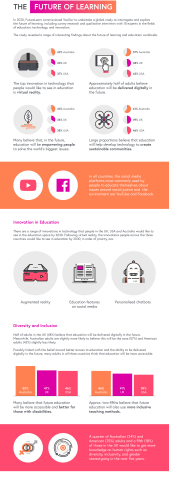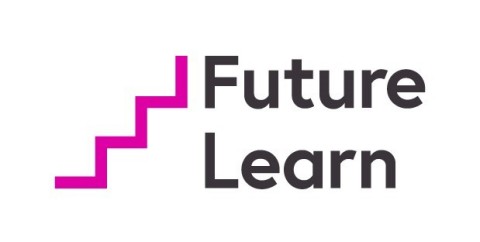New Study From FutureLearn Reveals the COVID-19 Pandemic and Social Issues Have Fundamentally Changed the Global Learning Landscape - and the American Dream
New Study From FutureLearn Reveals the COVID-19 Pandemic and Social Issues Have Fundamentally Changed the Global Learning Landscape - and the American Dream
Of Americans surveyed:
- 40% attribute the pandemic to losing their jobs, which has increased online learning by 34%
- 30% believe online learning will help develop their passions and change career paths in the next decade
- 25% say they’d spend their own money to learn a new skill to start a new job despite record-breaking unemployment numbers in the U.S.
NEW YORK--(BUSINESS WIRE)--FutureLearn, a leading global online learning platform, today unveiled its The Future of Learning Report developed with YouGov, a market research and data analytics firm. Measuring the future of learning worldwide, it features commentary from experts and insights from three global markets – U.S., UK and Australia. The report spotlights America’s changing attitudes towards learning and the educational landscape impacted by COVID-19 and social issues like the Black Lives Matter movement.
The survey reveals:
10 Global Trends Over The Next Decade Including:
- Women believing that education has the power to make the world a better place
- Inclusivity and accessibility is being addressed
- The younger generation is accelerating change with online learning increasing
- “Jobs for life” are rapidly on the decline
Four Themes Were Explored:
- Women and learning
- Generational distinctions
- Access, inclusion and self-education
- Personal and professional development
Key Takeaways:
- The pandemic has impacted careers across the globe forcing people out of jobs and re-evaluating careers, increasing online learning
- 49% of the global population think online learning creates better access for disabled people
- 38% of women believe education is key to improving human rights
- Millennials (22%) and Generation Zs (37%) turn to social media to educate on societal and political issues
- Younger generations are driving online learning; 21% strongly agree it provides similar benefits to traditional education
PERSONAL & PROFESSIONAL DEVELOPMENT
- The core benefit to online learning is being able to learn with people who you wouldn’t normally be in a class with and “the ability to share experiences, the ability to connect with others is amazing,” said Patricia Davidson, Dean of Johns Hopkins School of Nursing
- In the next five years, 40% of Americans will learn online
- 20% of Americans would prefer to work in a different industry altogether by 2030
“Online learning grew in popularity during the pandemic and will continue as technology advances (like virtual reality) and as access becomes universal - especially given world issues that people want to know more about – climate, inclusivity and diversity,” said FutureLearn’s Director of Learning Matt Jenner.
In Addition, Americans Believe Online Education will have the Power to:
- Develop technologies that create sustainable communities (51%)
- Increase innovation in medicine (48%)
- Make the world a more diverse, culturally accepting place and lessen violence (42%)
- Create opportunity to try different industries (41%)
- End educational inequality (36%)
Americans Believe Education will be:
- Delivered digitally (49%)
- More accessible globally (44%) and to people with disabilities (49%)
- More inclusive in teaching methods (42%)
- Empowering people to solve issues of human rights, climate, sustainability and equality (37%)
Over the next five years, many Americans said they’d like to develop knowledge to expand hobbies, increase confidence and have a positive impact on their community when it comes to:
- Mental health (33%)
- Physical health (32%)
- Personal finance (29%)
- Being a conscientious citizen (28%)
- Human rights (21%)
By the end of 2021, 31% of Americans say they’d pursue online learning to develop their passions to change their current career:
- 25% would spend personal time and money to learn additional skills
- Yet when it comes to setting up a new business, 32% believe they don’t have the skills and 55% don’t have the finances
- Conversely, 49% feel online learning can help teach new technologies, 40% feel it can increase global networking, and 35% feel it can develop management skills
INCLUSION AND ACCESS
With nearly half of people globally (49%) believing online learning will be more accessible for people with disabilities, introverts are welcoming it according to 48% of those surveyed, as it enables people to feel more confident and learn subjects traditionally limited to the linear educational path.
Diana Laurillard, Professor of Learning with Digital Technology at UCL said, “We have to make sure that digital innovation and acceleration does not widen this disparity.”
Dr Rachid Hourizi, Director at the Institute of Coding adds, “There are some people for whom online education is exactly the right path, and without it they wouldn’t have the opportunity they currently do. It’s perfectly possible to design brilliantly useful online education, but it’s equally possible to create a new set of exclusions if we design online education poorly.”
Interestingly, 37% of Americans agree online learning can provide similar benefits to formal, on-campus education with 25% likely to take an online course within the next five years to grow their skills to get ahead in their careers. Moreover, 32% of Americans believe online learning can allow for greater inclusion in education.
Americans surveyed said they see the following as a benefit to take an online course because:
- It allows people to learn at their own pace (55%)
- It is financially accessible (42%)
- Offers privacy that enables people to feel more confident to learn subjects they wouldn’t usually feel comfortable taking (41%)
- Provides high quality education to people physically constrained (42%)
- Physically accessible (39%) and allows people to learn at one’s own pace (55%)
- Enables people to learn more targeted skills (42%) and learn new skills needed to achieve personal goals (39%)
WOMEN: THE IMPACT OF ONLINE EDUCATION
In the U.S., women are more likely to agree online learning allows for:
- Greater opportunity to try different industries (46% versus men at 36%)
- Making the world a more diverse, culturally accepting place (39% versus men at 35%)
- Using more inclusive teaching methods (45% versus men at 33%)
More women are choosing to “Study traditionally male-dominated sectors, such as engineering, pharmaceuticals and accounting due to online accessibility,” said educator Ranata Hughes of Florida A&M University (an HBCU school).
Women say education can directly empower people to solve the world’s biggest issues with 38% believing it can improve human rights and access to justice. Women also feel education can better help their well-being with 35% globally wanting to learn more about nutrition, diet and physical health, with 38% interested in expanding their knowledge in mental health.
In the U.S., 41% of women consider mental wellness a priority as compared to just 25% of American men. Improving professional confidence (52%) and expanding personal interests (46%) also featured highly as motivations to learn.
GENERATIONS: THE EVOLUTION OF SELF-EDUCATION THROUGH DIGITAL
2020 was an impactful year with movements such as Black Lives Matter, political elections, LGBTQ+ rights, the gender pay gap and climate change dominating the news cycle alongside the ever-present COVID-19 pandemic.
Nearly a quarter of people globally (23%) plan to access education features on social media platforms for learning, including the “Topics” feature on Twitter.
With nearly half the global population desiring to have a positive impact on their community (46%) and the world (44%), there is ongoing enthusiasm to learn about important topics; 40% think future education will empower people to solve world issues. Americans increasingly turn to Facebook (17%) and YouTube (16%) to educate themselves, signaling a need for online courses more than ever.
THE FUTURE OF LEARNING
Throughout the report, there is excitement and expectation around the future of learning from both experts and the public. As people worldwide are hungry to keep learning and developing themselves, FutureLearn has recently launched ExpertTracks, a new digital product designed to give individuals flexible, subscription-based access to in-demand skills, on-demand for career and personal development.
“FutureLearn’s newly launched product, ExpertTracks, aims to meet learner demand for topics that not only explore social issues but subjects that will give them a competitive edge in their career,” says Matt Jenner, Director of Learning at FutureLearn.
NOTE TO PRESS:
To request an interview: Laura Hall, Laura@talkertailor.com, 917.544.6344
For more information:
Contacts
Laura Hall, Laura@talkertailor.com, 917.544.6344

